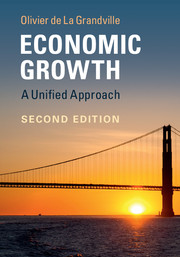Book contents
- Frontmatter
- Dedication
- Contents
- Foreword
- Preface to the second edition
- Introduction to the first edition
- PART I POSITIVE GROWTH THEORY
- PART II OPTIMAL GROWTH THEORY
- PART III A UNIFIED APPROACH
- 14 Preliminaries: interest rates and capital valuation
- 15 From arbitrage to equilibrium
- 16 Why is traditional optimal growth theory mute? Restoring its rightful voice
- 17 Problems in growth: common traits between planned economies and poor countries
- 18 From Ibn Khaldun to Adam Smith; a proof of their conjecture
- 19 Capital and economic growth in the coming century
- In conclusion: on the convergence of ideas and values through civilizations
- Further reading, data on growth and references
- Index
17 - Problems in growth: common traits between planned economies and poor countries
from PART III - A UNIFIED APPROACH
Published online by Cambridge University Press: 01 December 2016
- Frontmatter
- Dedication
- Contents
- Foreword
- Preface to the second edition
- Introduction to the first edition
- PART I POSITIVE GROWTH THEORY
- PART II OPTIMAL GROWTH THEORY
- PART III A UNIFIED APPROACH
- 14 Preliminaries: interest rates and capital valuation
- 15 From arbitrage to equilibrium
- 16 Why is traditional optimal growth theory mute? Restoring its rightful voice
- 17 Problems in growth: common traits between planned economies and poor countries
- 18 From Ibn Khaldun to Adam Smith; a proof of their conjecture
- 19 Capital and economic growth in the coming century
- In conclusion: on the convergence of ideas and values through civilizations
- Further reading, data on growth and references
- Index
Summary
Planning the economy is just one manifestation of the perennial desire to mould society into a very precise, rigid, shape. All too often, unfortunately, that shape results from the whim of a few individuals. The problem with planning is two-fold: on the one hand its aims are intuitively appealing, since they are nothing less than society's future welfare. Also, the unfortunate appeal of planning is founded on the belief that private interests are fundamentally opposed to public interests. That belief is very deep, and may be traced as far back as we can go in history. Han Fei Tzu justifies this opposition by the very way “private” and “public” have first been written: “In ancient times when Ts'ang Chieh created the system of writing, he used the character for ‘private’ to express the idea of self-centeredness, and combined the elements for ‘private’ and ‘opposed to’ to form the character for ‘public’. The fact that public and private are mutually opposed was already well understood at the time of Ts'ang Chieh. To regard the two as being identical in interest is a disaster which comes from lack of consideration”.
A further difficulty to dismissing planning offhand is that it is almost impossible to imagine that its consequences will be the exact opposite of its intent. A planned economy, as it will turn out, will achieve neither the objectives assigned to it, nor its potential.
In this chapter, we will describe some of the problems encountered by planned economies. We will then draw a parallel between those economies and countries whose fate is to remain poor unless they put together a number of conditions necessary for growth and development.
That society could acquire more of some essential goods or services at a lesser cost is a natural wish. Why shouldn't a central authority decide upon the amount of goods to be produced and the prices at which these should be sold? In the event of possible refusal, producers may be coerced to do so, for instance by turning private ownership of capital (land and all industrial equipment) into public, or state property.
- Type
- Chapter
- Information
- Economic GrowthA Unified Approach, pp. 383 - 391Publisher: Cambridge University PressPrint publication year: 2016



